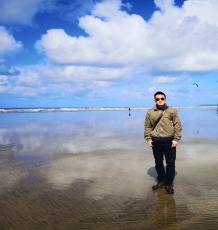
Dr Huiyi Yang
Honorary Lecturer
H.Yang4@exeter.ac.uk
Not known
Laver Building 906
Laver Building, University of Exeter, North Park Road, Exeter, EX4 4QE, UK
Overview
Huiyi’s research focuses on using modelling approaches to understand climate change and air pollution impacts on plant growth, biomass/yield and food security. He is interested in assessing uncertainty and adaptation approaches to climate change, especially for those regions most vulnerable to climate change.
Huiyi joined the Geography Department at the University of Exeter as an Honorary Lecturer in 2022. Huiyi has extensive collaborations with University of Leeds, Rothamsted Research, UK Met Office, Chinese Academy of Sciences (CAS), Chinese Academy of Agricultural Sciences (CAAS), Nanjing Agriculture University, etc.
Huiyi obtained his BSc and PhD from the University of Leeds. He initially trained in climate and atmospheric science and then directed his research into climate change impacts on agriculture through his work at the University of Exeter and Rothamsted Research Institute. This broadening of focus has naturally made his work more interdisciplinary and has enabled him to contribute to these research areas in a unique way.
Qualifications
BSc. Atmospheric Science and Meteorology (University of Leeds)
PhD Cloud microphysics and Climate Change (University of Leeds)
Research
Research interests
Huiyi’s research interests focus on interaction between agriculture, climate and humans. He currently has the following lines of research:
- Development and evaluation of LSM and crop models by using observational data from field experiments.
- The impact of climate and environmental factors (ozone, aerosol, etc) on crop yields/production, and consequent social-economic impacts.
- Evaluating the feasibility of adaptations under different weather conditions especially brought about by climate change, such as drought or high temperature.
- Regional and global climate change impacts on water, carbon, and the nitrogen cycle.
Field experimental science is fundamental and of vital importance for underpinning modelling work. Establishing modelling with sufficient grounding in observations is still the key challenge for modelling communities to understand the impact of climate and environmental changes on agriculture and human societies. To close this gap, Huiyi has collaborated closely with field scientists to rigorously develop and evaluate models. Huiyi is also interested in combining statistics with LSM and crop models to improve quantitative model predictions.
Publications
No publications found



